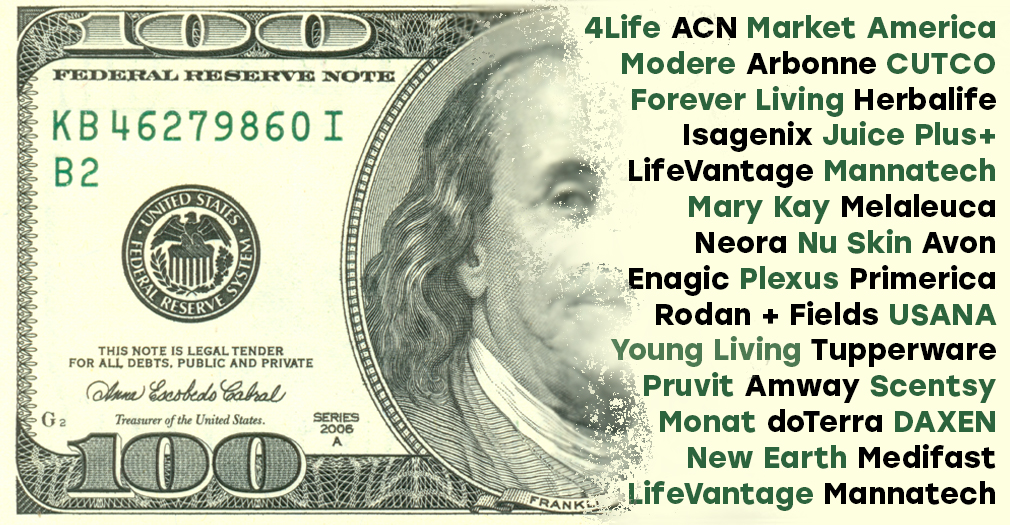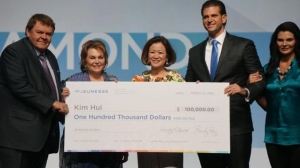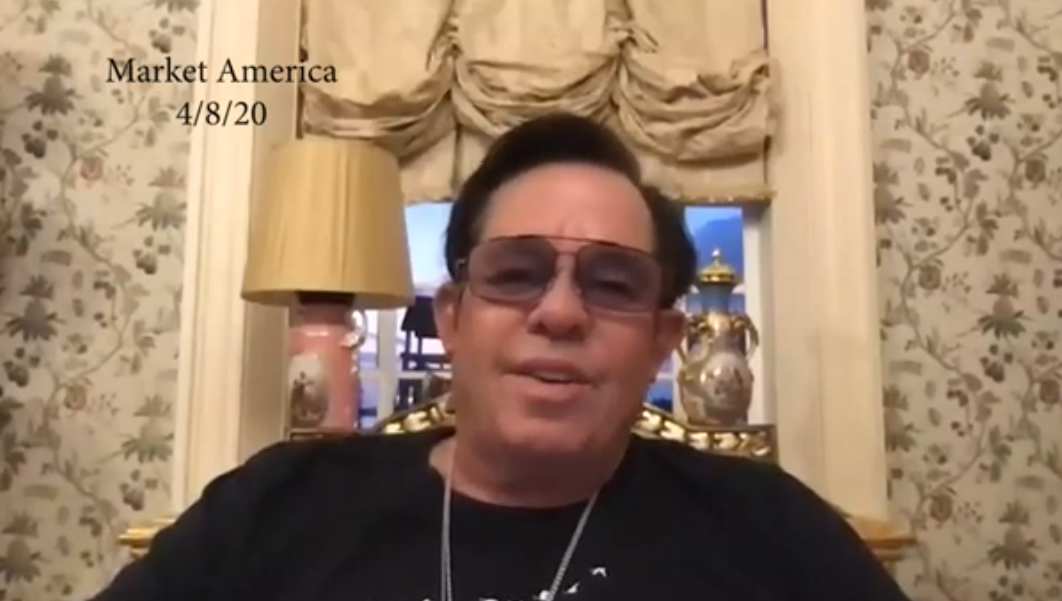
MLMs Continue to Recruit with Deceptive Earnings Claims
TINA.org investigation finds 98% of MLMs using misleading income claims.
More than 97 percent of DSA member companies use or have used misleading income claims.
When then FTC Chairwoman Edith Ramirez took the stage at the Direct Selling Association’s Business & Policy Conference in Washington, D.C. in October 2016, she did not mince words when it came to the widespread use of inappropriate earnings claims as a means of recruitment in the Multilevel Marketing – a way of distributing products or services in which the distributors earn income from their own retail sales and from retail sales made by their direct and indirect recruits. industry.
[M]ulti-level marketers should stop presenting business opportunities as a way for individuals to quit their jobs, earn thousands of dollars a month, make career-level income, or get rich because in reality, very few participants are likely to do that. Although it may be true that a very small percentage of participants do have success of this type, testimonials from these rare individuals are likely to be misleading because participants generally do not realize similar incomes.
More than a year later, it appears few if any of the The Direct Selling Association (DSA) is the national trade association for direct selling companies. members in attendance that day took the warning to heart.
A TINA.org investigation found more than 97 percent of DSA member companies engaged in misleading marketing schemes that peddle false and unsubstantiated earnings claims trying to convince prospective distributors to join their MLM network. TINA.org’s probe examined the marketing of every DSA member company as of Nov. 29, 2017 and found that 137 out of 140 misrepresented the amount of money participants are likely to earn — misrepresentations that cause real and substantial harm to consumers.
TINA.org’s findings not only constitute violations of FTC law, they also breach the DSA’s own Code of Ethics and in doing so contradict DSA President Joe Mariano’s public statements on the supposed higher standards of the code:
DSA enforces one of the most rigorous self-regulatory codes of ethics in business today, ensuring that direct selling companies not only follow the law, but in many cases exceed its requirements.
“All too often, consumers with limited capital are induced to part with their money by MLM promises of unlimited wealth that will never come to fruition,” said TINA.org’s Executive Director Bonnie Patten. “It’s time that the DSA and its membership were held accountable for these unsubstantiated income claims.”
As a result of these findings, TINA.org has notified the DSA, the DSA Code of Ethics Administrator, and each MLM company in TINA.org’s database of the problematic claims.
TINA.org investigation

Using the Nov. 29, 2017 DSA membership list, TINA.org investigated every company on the roster and found that out of 140 member companies (which includes divisions of certain companies), 137 are making or have made misleading income representations. TINA.org has amassed more than 3,000 examples of companies and/or their distributors making inappropriate earnings claims on their websites and social media platforms. This, despite the fact that Mariano informed TINA.org just last year that:
Beginning in 2017, 100 percent of DSA member companies will undergo a mandatory ethics review to ensure compliance with our Code of Ethics, including in the areas of income and product claims.
The claims that TINA.org has compiled range from assurances of achieving financial freedom, to making unlimited income, to being able to quit your job and stay home with your children. And these income representations are not hard to find. For the majority of companies, one need look no further than their websites and social media pages. Other assertions of wealth can be found simply by googling the name of an MLM company and “millionaire,” or “financial freedom,” or “free car,” resulting in a plethora of websites and social media posts making false and deceptive claims. Such was the strategy that led to a number of TINA.org’s findings.
While most of the MLM databases on TINA.org contain a sampling of around 20 inappropriate income claims, four companies (Kyani, Nerium International, Reliv International, and Team National) have more than 100, Jeunesse Global has more than 80, and 25 companies have less than 10 (Aerus, Become International, Boisset Collection, Carico International, Compelling Creations, Dudley Beauty, Energetix, Flavon USA, Harmony Green America, HTE USA, John Amico Haircare Products, The Kirby Company, New Earth, Orenda International, RBC Life, Regal Ware, Rena Ware International, Rexair, Sanki Global, SAS Spurilla, Simply Said, SimplyFun, Tealightful, Tristar Enterprises and Zinzino). TINA.org did not find inappropriate income claims for three companies: Red Rock Traditions, WBC Group (which is affiliated with Origami Owl), and World Book.
Time and again, the DSA has issued press releases congratulating itself on how it “continues to set the standard for industry behavior,” and promoting its “stringent commitment to the highest standards of ethical business practices in direct selling.” But TINA.org’s investigation documenting thousands of unsubstantiated earnings claims calls into question the organization’s true commitment to consumer protection. For example, TINA.org found:
[To view a sample of inappropriate income claims made by 137 DSA member companies (and divisions of companies), click here.]
To learn about DSA member companies making illegal disease-treatment claims, click here.
Most distributors do not earn substantial incomes
It is well established that the vast majority of distributors will never achieve financial independence with their MLM business. As Mariano, the DSA president, wrote just last year:
[W]e must increase our efforts to ensure prospective distributors are fully aware—clearly and unashamedly—that for most, direct selling can provide supplemental income. Most distributors will not realize a replacement income, let alone a lavish lifestyle.
And this fact, that most MLM participants do not earn substantial incomes, is not new. The DSA acknowledged more than a decade ago that the majority of distributors made less than $10,000 per year from direct selling, with a median annual gross income of about $2,400, or $200 per month, which means that half of all distributors made less than $200 per month before deducting expenses associated with their business.
Moreover, a review of 32 income disclosure statements that TINA.org was able to dig up for current DSA member companies revealed that more than 80 percent of distributors grossed less than $1,200 annually or less than $100 per month before expenses. And for about half of these companies, the disclosures indicate that the majority of distributors made no money at all.
For example, Team National, whose CEO holds a seat on the DSA Board of Directors and also chairs the DSA Education Committee, revealed in its 2016 income earnings disclosure statement that 93 percent of its active distributors (or about 45,000 people) averaged a gross income of less than $500 for the year, or less than $42 per month before deducting expenses. The disclosure goes on to state that about 86 percent of all active distributors “received no income at all,” which equates to almost 42,000 distributors losing money. At the same time, Team National has posted more than 120 distributor testimonials, including over 50 videos, making lavish lifestyle claims.
Given these statistics, it’s not surprising that last year former FTC chairwoman Ramirez stated:
It is time that MLM income representations matched the income reality of the majority of multi-level marketing participants. This means both explicit statements about how much a participant is likely to earn, as well as implied claims and lifestyle claims.
Link between income claims and pyramid schemes
 In the past 40 years, the FTC has filed 26 cases against MLMs alleging that they were operating illegal pyramid schemes. In all of these cases, the FTC also alleged that the defendants made false earnings representations. Undoubtedly one of the reasons for this link is that claims of life-changing income are generally tied to a distributor’s recruitment efforts (as opposed to selling the companies’ products or services). And one of the hallmarks of a pyramid scheme is its “recruitment focus.”
In the past 40 years, the FTC has filed 26 cases against MLMs alleging that they were operating illegal pyramid schemes. In all of these cases, the FTC also alleged that the defendants made false earnings representations. Undoubtedly one of the reasons for this link is that claims of life-changing income are generally tied to a distributor’s recruitment efforts (as opposed to selling the companies’ products or services). And one of the hallmarks of a pyramid scheme is its “recruitment focus.”
Moreover, TINA.org’s investigation found that claims of unlimited wealth were almost always tied to a recruitment focus. As top Jeunesse distributor Kim Hui explained:
So first thing we’ve got to do is go out there and recruit. . . . We’re building a distribution channel if you would and so what we do – the first thing we do is recruit. What do we recruit? We recruit entrepreneurs. . . . And the second thing we do is that we teach other people how to recruit because this business is all about duplication. It’s not about one person selling all the time cause that’s linear income, you know, trading time for money. But this business model is about building distribution and about creating wealth.
In addition to recent FTC actions against Herbalife and Vemma Nutrition Company alleging deceptive income claims and pyramid scheme behavior, at least 12 federal class-action lawsuits have been filed this year making similar allegations. These lawsuits claim, among other things, pyramid scheme activities together with false earnings representations against MLM companies and their top distributors. For example, plaintiffs in a recent lawsuit against Nerium International allege:
Nerium . . . represented to plaintiffs . . . that Nerium provides a business opportunity that can build ‘a dream lifestyle’ and that Plaintiffs could be financially independent by virtue of selling Nerium’s ‘age-defying’ creams. But in reality, these promises of riches, wealth, and gifts couldn’t be further from the truth. Characterized by some of its former employees as a scam and a cult, Nerium touts that it has generated one billion dollars in cumulative sales after just four years. These sales are based on the recruitment of new brand partners into the pyramid scheme that Nerium has amassed.
Such allegations show the risk that MLMs run in touting false and unsubstantiated income claims. For while MLMs making inappropriate earnings claims may not be pyramid schemes, all pyramid schemes boast of unlimited riches. As explained in the seminal case of Koscot Interplanetary, Inc., a pyramid scheme “thrives by enticing prospective investors to participate in its enterprise, holding out as a lure the expectation of galactic profits. All too often, the beguiled investors are disappointed by paltry returns.” And as Ramirez stated:
False and unsubstantiated earnings claims are deceptive and unlawful under Section 5 of the FTC Act. Unfortunately, however, our law enforcement experience shows that many MLMs continue to misrepresent the amount of money participants are likely to earn. In fact, in all of our cases against multi-level marketers, the FTC has alleged that the defendants made false earnings representations. These misrepresentations cause real harm to consumers, and they need to stop.
In a statement to TINA.org, DSA President Joe Mariano said:
DSA welcomes information about compliance with our Code of Ethics from any source. Any credible information relating to possible non-compliance with our Code an [sic] or the law will be reviewed by the DSA Code Administrator and responded to appropriately. TINA has not provided DSA any report or specific information and it is thus impossible to comment further upon the veracity of any claims, complaints, or allegations until such information is provided to the Association, the DSA Code Administrator, or individual member companies.
For more of TINA.org’s coverage of MLM companies, click here.
TINA.org investigation finds 98% of MLMs using misleading income claims.
Deceptive earnings claims edition.

